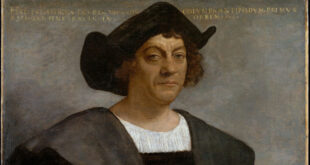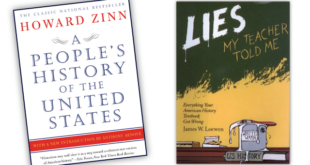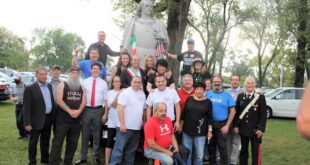My quest for the truth about Christopher Columbus has led me to more discoveries than I could possibly have imagined.
I knew a few things before I embarked, of course: that Columbus set the gold standard for perseverance and courage, that his first voyage was an act of navigational brilliance and that the world was forever changed by it. I also knew the countless misdeeds attributed to him couldn’t all be true.
Until I dug much deeper, though, I had no idea how wrong the naysayers were. The Columbus I’ve come to know was a staunch advocate for native rights whose best intentions were undone by his crew members during his tenure and by his successors after he was replaced as governor.
That realization opened my eyes in other ways as well.
I had to ask myself, “If I’m only learning about who Columbus really was after months of relentless research, how can I expect anyone else to have come to the same conclusion?” After all, the entire nation has been fed a steady diet of unchallenged misinformation about Columbus for decades.
That vantage point has allowed me to see the opposition in a completely different light. From now on, Native Americans and the activists who advocate for them are no longer the enemy. Unless proven otherwise, they’re future friends burdened with misconceptions they’ve come by honestly.
Even the most vociferous opponents of Columbus are most likely only parroting fallacies they’ve gleaned from the internet. If we have any hope of moving the needle in our direction, we have to stop accusing them of cheating to move it the other way.
My quest also led me to an in-depth exploration of the thoughts, feelings and experiences of the Native-American community. The heart-rending pain I encountered commanded my sympathy and respect, and further transformed my thinking.
I’ll never again claim that Columbus “discovered” America. The native populations were here first, and to call that world-changing encounter anything but that — an encounter — is the smallest of all possible concessions. And that’s just for starters.
I used to trumpet Columbus’ first voyage as a turning point that united two worlds, launched a massive exchange of cultures and eventually led to the creation of America. I won’t be touting that again, either, because of what it heralded for our once-vast native nations.
From then onward, they were driven from their lands and mercilessly slaughtered while being lied to every step of the way. And it only adds insult to injury to argue that native tribes were doing unto each other as we were doing unto them. Atrocities are atrocities regardless of who commits them and when.
We now have credible evidence in hand that Columbus stood four-square against those abuses, and that’s where we have to hang our hat. We can never expect Native Americans to embrace European colonialism and American expansionism, but if we put the honest work in, we can establish Columbus as an exception to the rule.
Italian Americans have had our own travails in our long march toward the mainstream, but it’s been a walk in the park compared to the centuries of abuse Native Americans have endured.
If we want them to respect our pain and allow us our hero, we have to respect their pain and show them that Columbus was worthy of reconsideration. They’re going to fight it tooth and nail because they’ve been misled for so long, and the only way to win that fight is to come armed with boundless empathy and patience in addition to all the facts.
There was a shining moment three decades ago when Native- and Italian-American leaders laid down their arms and marched down State Street in Chicago together on Columbus Day. (For more, click here.) If we have any hope of doing that again, we first must walk a mile in their shoes.
The above appears in the May 2021 issue of the print version of Fra Noi. Our gorgeous, monthly magazine contains a veritable feast of news and views, profiles and features, entertainment and culture. To subscribe, click here.
 Fra Noi Embrace Your Inner Italian
Fra Noi Embrace Your Inner Italian






